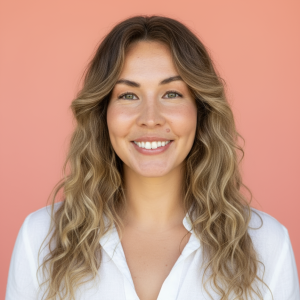Reflections on a Summer of Marine Science, Coral Restoration, and Ocean Education
As summer comes to a close, our incredible interns share their experiences with the Perry Institute for Marine Science and the Rising Tides program. From coral restoration to community conservation, each intern made an unforgettable impact on marine conservation in The Bahamas.
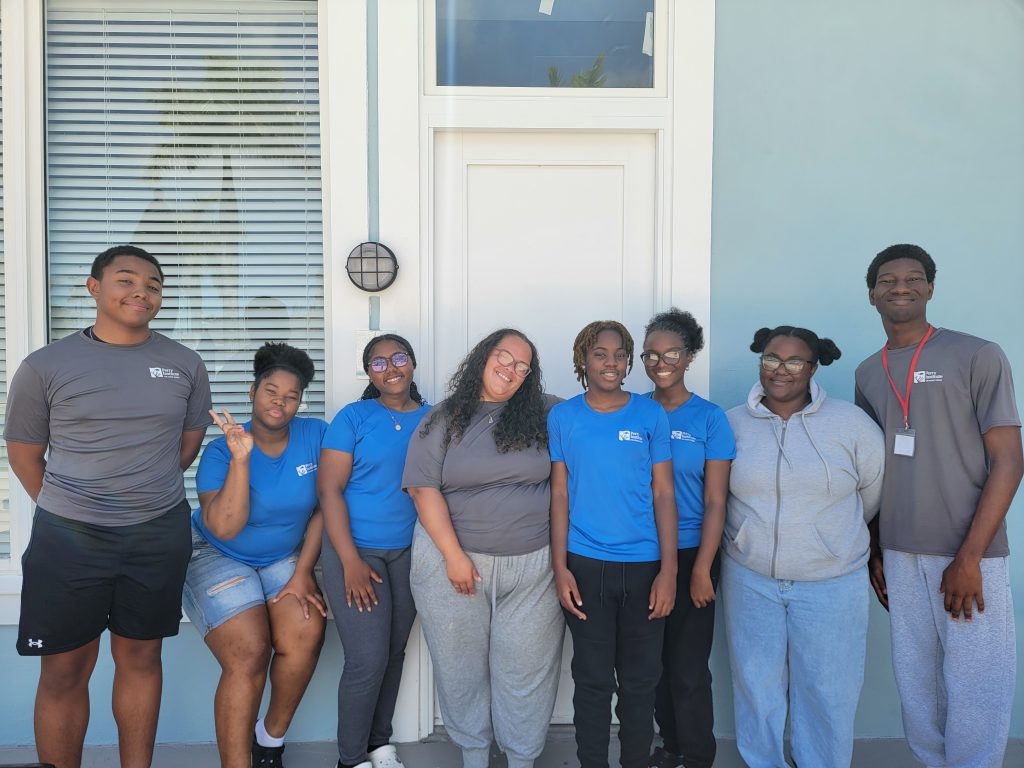
Zion
My time as the Rising Tides intern with the Perry Institute for Marine Science has been nothing if not wondrous. From my advanced dive training up to my last field day with the Rising Tiders. I have learned much in my nine weeks about both myself and the field of marine science education. The STEAM (Science Technology Engineering Art Math) camp training that was provided near the beginning of the Rising Tides summer session gave me the foundation I needed to lead lessons, make activities and to confidently engage with students. My time as an educator in the Rising Tides program has taught me things like patience, adaptability, time management and how to meet students where they are. It has been an absolute delight seeing the young minds of Rising Tides light up with curiosity about the ocean and how we can protect it. I am grateful for the Perry Institute for Marine Science giving me this opportunity. I am leaving this internship more inspired than ever to continue in the field of marine science education and conservation.
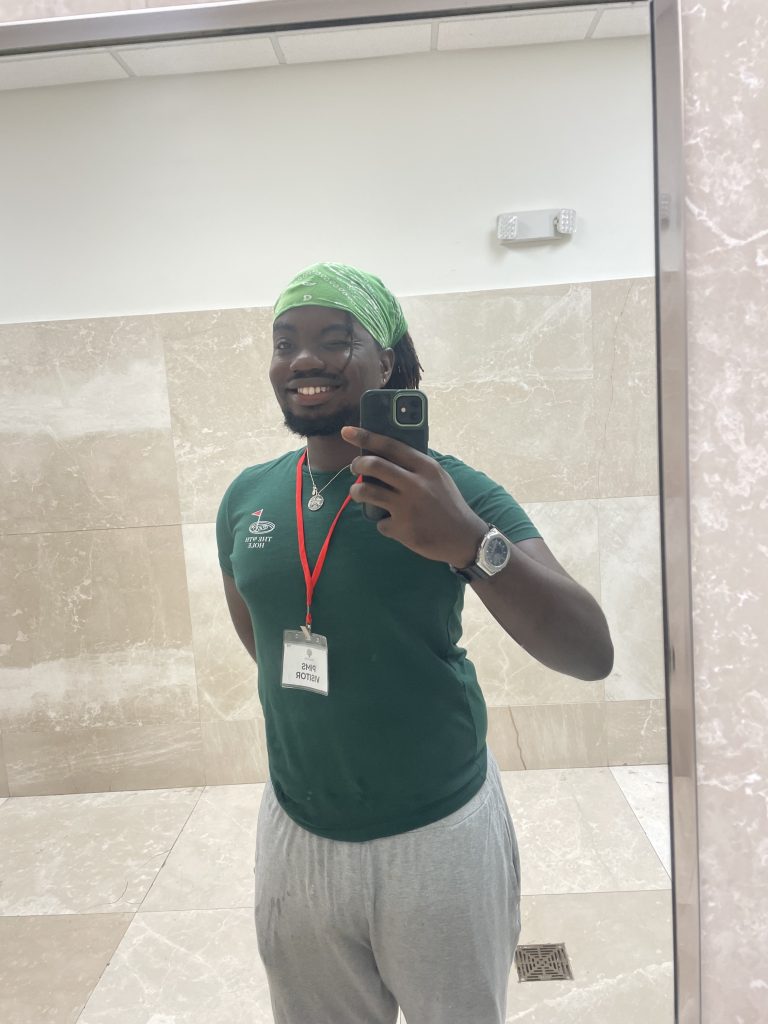
T’afari
Hi everyone, my experience as an intern at the Perry Institute of Marine Science has been enlightening and educational. I’m grateful for the opportunity to participate in the community conservation education and action team through this internship. I worked with my mentor, Makeda Serjui, to gather social science data about local perspectives on various topics and issues in The Bahamas. This internship taught me how social media can be used to track the public’s views on certain topics and address issues.
Coding social media comments on different apps, such as Facebook, Instagram, and others, was one of my primary responsibilities. For instance, one of our themes involved looking into local opinions regarding a coastal development occurring in an area that the public found to be highly important. As a result, we developed a coding scheme to extract the desired data. These coding categories aid in identifying the local perspective on that development and the actions taken in their country.
Furthermore, I had to prepare interview questions about shark perception in The Bahamas to find out what locals think of sharks and why they have such a negative reputation. I also had to conduct literature reviews about specific topics, such as the 2023 underwater heatwave on corals, shark perception in The Bahamas, and coastal development in Bimini. Based on my understanding, this study can help improve management and address conservation issues in The Bahamas by highlighting the thoughts and inputs of locals. Overall, my internship experience was amazing and I am glad that I got to participate in research that can one day benefit the Bahamas.
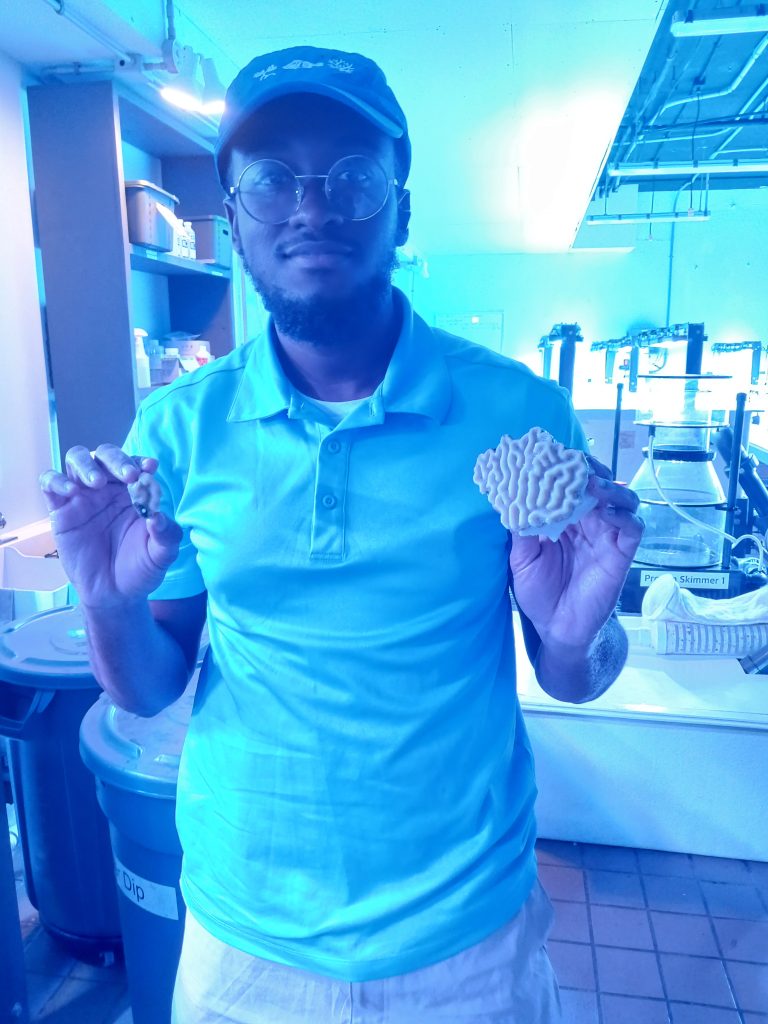
Kirkwood
Greetings and a Pleasant Good Day to all. My name is Kirkwood Farquharson II. I am a senior at the University of the Bahamas, and I am currently studying to obtain a Bachelor’s Degree in Architecture. While that may be, I was ecstatic to be granted the opportunity to be a part of this internship experience. During my time as an intern at the Perry Institute for Marine Science, I was able to obtain my Advanced Open Water Diver’s Certification, along with other Diving Specialties. I was educated on various topics through weekly skill building sessions, and met some amazing people who also shared the same interests that I do, when it comes to marine science.
At the latter part of my internship, I was stationed at the Coral Gene Bank, located at Atlantis, Bahamas. Here, I learned about the facility itself, its importance, water quality testing, as well as how to maintain, observe, feed, collect, and treat corals. I also learned about SCTLD or Stony Coral Tissue Loss Disease, and how corals react to various changes in their environment. Finally, I gained tons of knowledge from the staff, Max and Stefana and my mentor, Ms. Morley, who all made my time and experience there very pleasant and fun.
Overall, my experience here as an intern at the Perry Institute for Marine Science has been extremely memorable, informative and extraordinary. I will definitely cherish this moment and great opportunity, as this was truly an experience that I will never forget. Thank you.
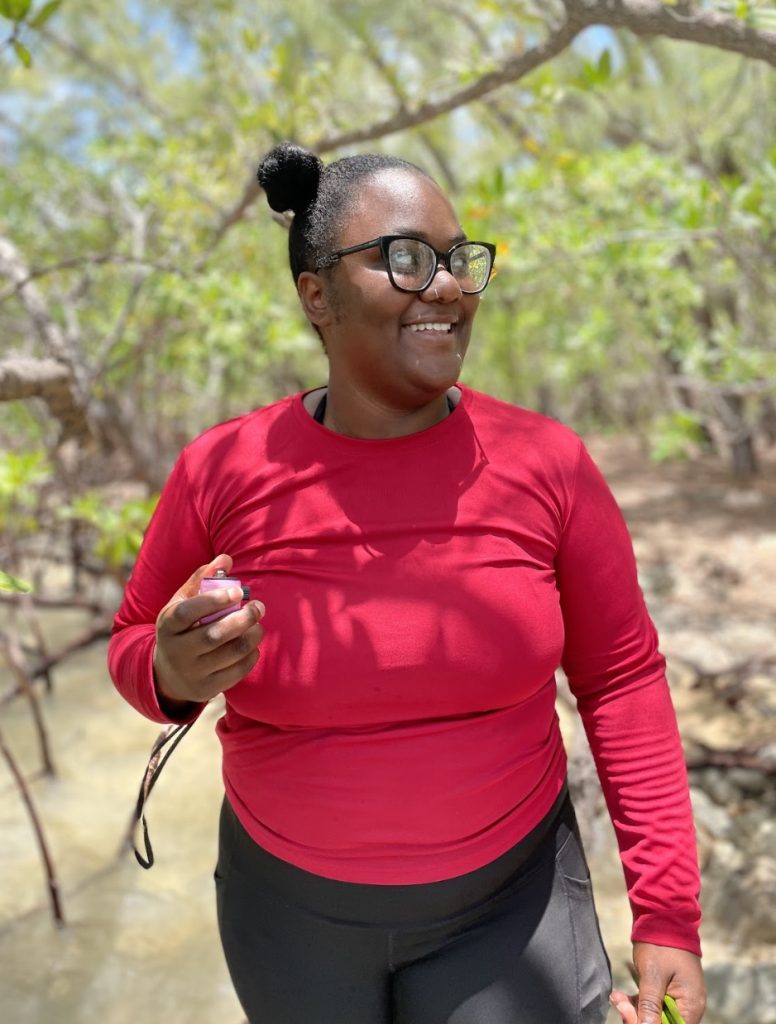
Meniya
This summer, I had the incredible opportunity to intern with the Perry Institute for Marine Science as a Data Collections Intern, and it has truly been an educational experience. One of the highlights of my experience was becoming Advanced Open Water dive certified, which allowed me to help clean coral nurseries and truly explore the marine environment. I also had the chance to meet and work alongside other students who share the same love for marine science, which made my experience extra special. However, one of the most meaningful parts of the internship was teaching the local youth about marine ecosystems in The Bahamas and how/why we should protect them. I conducted lessons on marine pollution and fisheries/bycatch, making sure to tailor them to The Bahamas. I am extremely grateful for the chance to learn from experts who are doing the work I hope to be a part of one day.
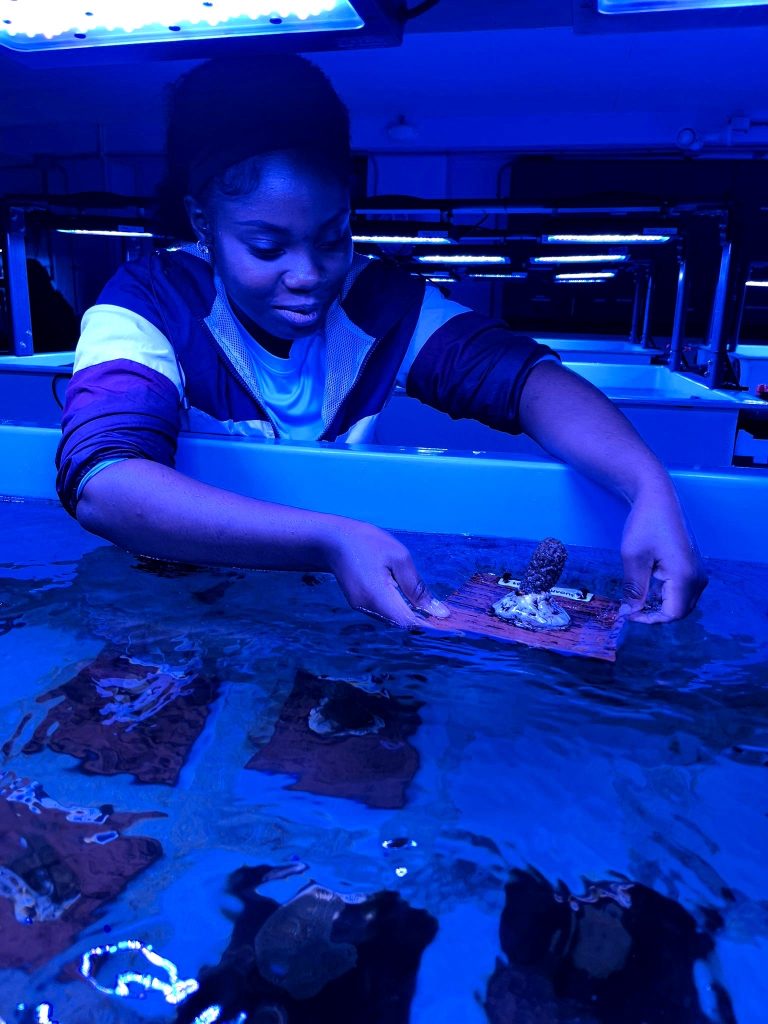
Dominique
Time is winding down, and my internship at PIMS is coming to an end! I’m excited to share some highlights from this unforgettable experience. Over the past few weeks, I’ve participated in numerous restoration dives focused on treating corals affected by Stony Coral Tissue Loss Disease (SCTLD). I learned how antibiotics are prepared and applied underwater to help protect vulnerable coral species. I also visited the Coral Gene Bank at Atlantis, where SCTLD-prone corals are preserved for future restoration. While there, I assisted with coral cleaning to remove algal buildup.
Another exciting part of my internship involved conducting rapid assessments to identify potential restoration sites based on coral health and diversity. I even helped create reef photo mosaics that are stitched together to create 3D images using photogrammetry, and will be used to monitor reef conditions over time. Back on land, I analyzed coral micro fragment growth rates using TagLab software and tracked changes in coral nursery health. As I wrap up, I have finalized my project on the restoration and monitoring methods used by the Coral Response Team. I’m incredibly grateful to PIMS for this opportunity and am proud to have earned my Advanced Open Water Certification during this journey!
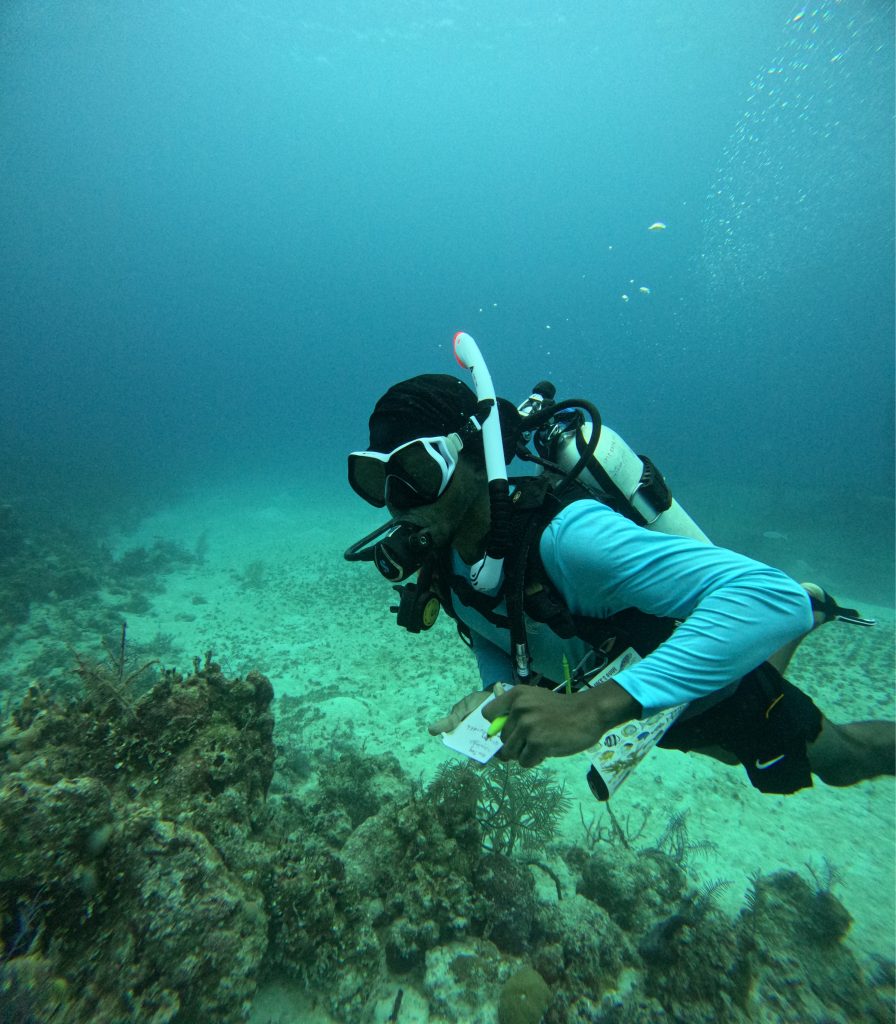
Micah
To the entire PIMS family, I want to thank you for blessing me with this once in a lifetime opportunity and for welcoming me with open arms. This internship has been more than just work; it’s been an experience filled with mentorship, laughter, learning, and most importantly a love for the ocean. I leave with unforgettable memories, lifelong skills, and a deeper connection and appreciation for marine conservation. While my time as a PIMS intern has come to an end, the lessons, friendships, and passion I’ve gained will carry on as I get ready to transition into the next chapter of my life.
About the Perry Institute for Marine Science (PIMS)
For more than 50 years, Perry Institute for Marine Science (PIMS) has advanced ocean stewardship around the world. Guided by our vision “Thriving Seas, Empowered Communities,” our scientists pair cutting‑edge research with hands-on conservation to protect coral reefs, mangroves, fisheries, and coastal habitats while supporting sustainable livelihoods. We collaborate with governments, NGOs, schools, and forward‑thinking businesses to turn data into action—whether restoring reefs through our Reef Rescue Network, mapping coastal ecosystems with drone and photogrammetry technology, or training the next generation of marine leaders. By discovering solutions, creating opportunities, and inspiring action, PIMS works to ensure a healthy ocean for people and the planet alike. Learn more at www.perryinstitute.org.
Dive Deeper
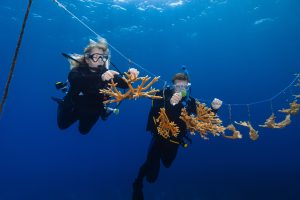
Stream2Sea Coral Care: The World’s First Reef-Positive Sunscreen
Stream2Sea Coral Care: The World’s First Reef-Positive Sunscreen | Perry Institute for Marine Science Conservation Partners Stream2Sea Coral Care: The World’s First Reef-Positive Sunscreen Discover why PIMS has partnered with

Build a Coral Reef for the Holidays | PIMS x Partanna
PIMS is partnering with Partanna to build a 100m² carbon-negative reef. Rick Fox is matching donations up to $25k. Help us build a sanctuary for the future.
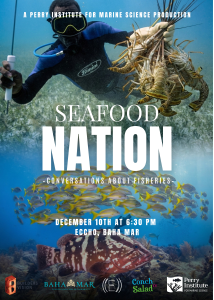
“Seafood Nation” Documentary Premiere Explores the Heart of Bahamian Culture and the Future of Fisheries
NASSAU, The Bahamas | December 5, 2025 – From the bustling stalls of Potter’s Cay to family kitchen tables across the archipelago, seafood is far more than just sustenance in
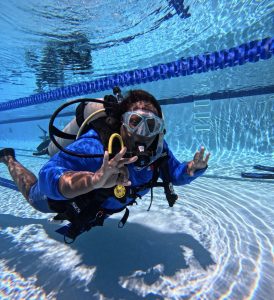
PIMS and Disney Conservation Fund Partner to Train 19 Government Divers
PIMS dive training in Nassau strengthened national coral restoration capacity across government agencies. Bahamas Dive Training Builds National Coral Restoration Capacity Last fall, between the months of September and October,
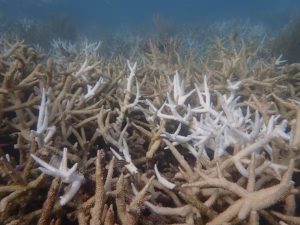
Florida’s Coral Reef Crossed a Line: What Functional Extinction Really Means for Elkhorn and Staghorn Corals
Reefs didn’t just bleach. They functionally vanished in one summer. A new Science study co-authored by researchers from the Perry Institute for Marine Science (PIMS) has found that Florida’s two
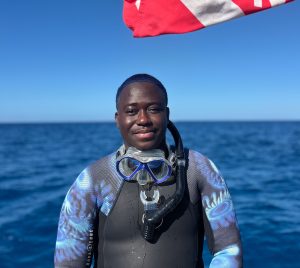
Q&A: Understanding the IDC Course at PIMS with Duran Mitchell
A former aquarist turned coral conservationist, Duran is passionate about understanding how all marine life connects. PIMS & IDC: Empowering New Dive Instructors for Marine Conservation PIMS & IDC: Empowering


